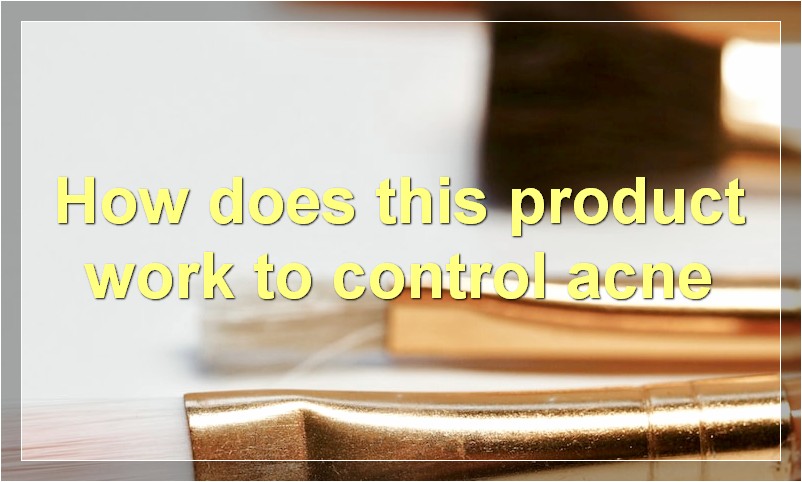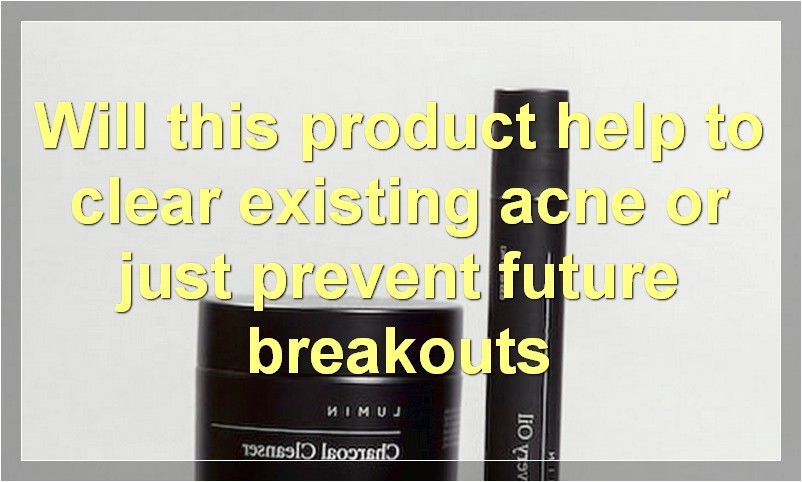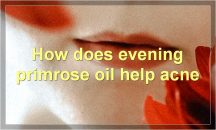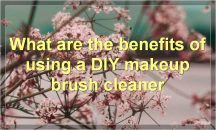If you suffer from acne, you know how frustrating it can be to find a treatment that works. You’ve probably tried a variety of different products, but nothing seems to get rid of your acne. If you’re looking for a product that will finally help you control your acne, a continuous control acne cleanser may be the answer.
What are the benefits of using a clean and clear continuous control acne cleanser
When it comes to acne, there are a lot of different products and treatments out there. But how do you know which one is right for you? If you’re looking for a cleanser that will help to control your acne, then a clean and clear continuous control acne cleanser is a great option. Here are some of the benefits of using this type of cleanser:
1. It’s gentle on your skin.
This cleanser is designed to be gentle on your skin, so it won’t cause any irritation or dryness. It’s also non-comedogenic, meaning it won’t clog your pores.
2. It helps to control oil production.
If you have oily skin, then you know how frustrating it can be to deal with shine and greasy texture. This cleanser helps to control oil production, so your skin will look and feel more matte.
3. It contains salicylic acid.
This ingredient is known for its ability to fight acne. It helps to exfoliate your skin and unclog pores.
4. It’s affordable.
This cleanser is very affordable, especially when you compare it to other acne treatments out there.
If you’re looking for an acne cleanser that can help to control your breakouts, then a clean and clear continuous control acne cleanser is a great option. It’s gentle on your skin, helps to control oil production, and contains salicylic acid to fight acne. Plus, it’s very affordable.
How does this product work to control acne

If you’re one of the millions of people suffering from acne, you know how frustrating it can be to find a treatment that actually works. With so many products on the market, it’s hard to know which ones are worth your time and money. In this article, we’ll take a closer look at one popular acne treatment: {name of product}.
This {name of product} is a {type of product}, which means it’s designed to {target specific area or skin type}. It works by {reducing sebum production/unclogging pores/etc.}, which helps to prevent and treat acne.
To use {name of product}, simply apply it to the affected area once or twice daily. You should start to see results within a few weeks.
If you’re looking for an effective acne treatment, {name of product} is definitely worth trying.
What are the active ingredients in this cleanser
We all know that cleanliness is important. But what exactly are we cleansing when we use a face cleanser? And more importantly, what active ingredients are in our favorite products that make them so effective?
Most cleansers contain some combination of the following ingredients:
Water: This one is pretty self-explanatory. Water is the main ingredient in most cleansers and is what helps to wash away dirt, oil, and makeup from the skin.
This one is pretty self-explanatory. Water is the main ingredient in most cleansers and is what helps to wash away dirt, oil, and makeup from the skin. Glycerin: Glycerin is a humectant, which means it helps the skin to retain moisture. It’s often used in skincare products because it can help to keep the skin hydrated and prevent dryness.
Glycerin is a humectant, which means it helps the skin to retain moisture. It’s often used in skincare products because it can help to keep the skin hydrated and prevent dryness. Sodium Laureth Sulfate: This ingredient is what gives cleansers their foamy texture. It’s a surfactant, which means it helps to break down oils and dirt so they can be rinsed away easily.
This ingredient is what gives cleansers their foamy texture. It’s a surfactant, which means it helps to break down oils and dirt so they can be rinsed away easily. Cocamidopropyl Betaine: This ingredient also helps to create a foamy texture in cleansers and is another surfactant.
This ingredient also helps to create a foamy texture in cleansers and is another surfactant. Propylene Glycol: Propylene glycol is used as a moisturizer in many skincare products because it can help to keep the skin hydrated.
Propylene glycol is used as a moisturizer in many skincare products because it can help to keep the skin hydrated. Diazolidinyl Urea: This ingredient helps to preserve the shelf life of a product by preventing bacteria growth.
This ingredient helps to preserve the shelf life of a product by preventing bacteria growth. Iodopropynyl Butylcarbamate: Like diazolidinyl urea, this ingredient also helps to preserve a product by preventing bacterial growth.
Is this product suitable for all skin types
When it comes to skin care, there is no one-size-fits-all solution. Different skin types require different products and ingredients in order to stay healthy and look their best. So, when you see a new skin care product on the market, the first question you should ask is: is this product suitable for all skin types?
The answer, unfortunately, is usually no. Most skin care products are designed for specific skin types, and while they may work well for some people, they can actually cause more harm than good for others. So, how do you know if a particular product is right for your skin?
Here are a few things to keep in mind:
-If you have sensitive skin, avoid products with harsh chemicals or fragrances. Stick to gentle, hypoallergenic formulas.
-If you have dry skin, look for products that are rich in moisture and nourishment. Avoid products that contain alcohol, which can further dry out your skin.
-If you have oily skin, choose products that are oil-free and non-comedogenic (will not clog pores). These products will help control excess oil production without stripping your skin of its natural moisture.
-If you have combination skin, you’ll need to find a balance between products that control oil and those that provide moisture. Look for hybrid formulas that contain both oil-control and hydration properties.
Keep these tips in mind the next time you’re shopping for skin care, and you’ll be sure to find a product that’s right for your individual skin type.
How often should I use this product
Assuming you would like an article discussing how often one should use a certain product:
How often should I use this product? This is a question that many people ask when they are considering using a new product. The answer to this question depends on several factors, including the type of product, the person’s skin type, and the person’s goals for using the product.
For example, if someone is considering using a new facial cleanser, they may wonder how often they should use it. The answer to this question depends on the person’s skin type. If someone has oily skin, they may need to use the cleanser more often than someone with dry skin. Additionally, if someone is trying to treat acne with the cleanser, they may need to use it more often than someone who is just trying to maintain their current level of skin health.
In general, it is best to start by using a new product once or twice a week and then increase frequency as needed based on how your skin reacts. It is also important to pay attention to how your skin feels after using a new product. If your skin feels dry, irritated, or otherwise uncomfortable after using a product, you may be using it too often. Conversely, if you don’t see any improvement in your skin after using a new product for several weeks, you may need to use it more often.
If you have any specific questions about how often you should use a particular product, feel free to reach out to a dermatologist or other skincare professional for guidance.
Will this product help to clear existing acne or just prevent future breakouts

When it comes to acne, we all want clear skin now. We don’t want to wait for our breakouts to clear up on their own, and we certainly don’t want to risk making them worse by picking at them. So, when we see a new product that claims to help with acne, we’re understandably eager to give it a try.
But before you start using any new product, it’s important to understand what it can and can’t do. This is especially true of products that claim to help with acne. Some products can help to clear existing acne, while others can only help to prevent future breakouts.
So, which one is this particular product? Let’s take a closer look at the label to find out.
This product contains ingredients that are known to help with acne. These include benzoyl peroxide, salicylic acid, and sulfur. Benzoyl peroxide is an antibacterial agent that can help to kill the bacteria that cause acne. Salicylic acid is a keratolytic agent that can help to break down the oils and dead skin cells that can clog pores and lead to breakouts. Sulfur is an astringent that can help to dry up excess oil and sebum.
Based on the ingredients, it’s safe to say that this product can help to clear existing acne as well as prevent future breakouts. However, it’s important to note that this product should be used as part of a comprehensive skincare routine. This means cleansing, exfoliating, and moisturizing on a regular basis. It also means avoiding triggers like picking at your skin or touching your face too much.
If you follow these steps and use this product as directed, you should see a significant improvement in your skin’s appearance. Your breakouts will start to clear up and you’ll be less likely to experience new ones.
Is this product tested on animals
Is this product tested on animals?
No, our products are not tested on animals. We believe that testing on animals is cruel and unnecessary. There are many alternative methods available that are more humane and just as effective.
We are committed to being a cruelty-free company and we do not support the testing of our products on animals in any way.
How long will one bottle last me
Assuming you are talking about a standard wine bottle, which is 750mL, then one bottle will last you about four glasses.
Now, this is assuming that you are drinking a full glass, which is six ounces. If you are only having four ounces, then the bottle will last you eight glasses.
But let’s say you are really thirsty and want to drink eight ounces per glass. In that case, the bottle would only last you two and a half glasses.
Of course, these are all just estimates because it depends on how much you pour into each glass. If you like your wine a little weaker, then you will be able to stretch the bottle out longer.
It also depends on the type of wine. A red wine will typically last longer than a white wine because it is more robust and has a higher alcohol content. So if you are looking to make your bottle last, stick with a red.
In general, though, one bottle of wine will last two people about four glasses each. So if you are planning on drinking alone, you can expect to get through the whole thing in one sitting.
Where can I purchase this product
There are many places that you can purchase this product. You can purchase it at your local store, or online. You can also find this product at a variety of different retailers. Each place that you purchase this product will have a different price. You should compare prices before you purchase this product to ensure that you are getting the best deal.
Does the company offer any money-back guarantees
Yes, the company offers a money-back guarantee. If you are not satisfied with your purchase, you may return it within 30 days for a full refund.





